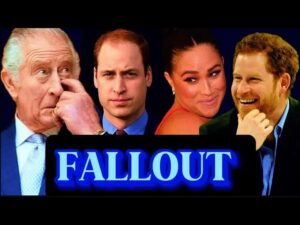After a lifetime of preparation and anticipation, King Charles III has finally ascended to the throne, marking a significant moment in British history.
For decades, he held the title of Prince of Wales, patiently waiting for this day.
Now, however, he faces the daunting task of leading a nation that is both eager and uncertain about his reign.
The weight of the crown is heavy, and the question on everyone’s mind is whether Britain is truly ready for its new monarch.
As Charles takes his place as king, the public sentiment is mixed.
While some embrace the change, others are skeptical about his ability to lead effectively.
This division of opinion is palpable, with many wondering if he can live up to the legacy left by his mother, Queen Elizabeth II.
The expectations are monumental, and the comparisons to her reign are inevitable.
Every decision he makes will be closely examined, as he steps into shoes that are not easily filled.
Queen Elizabeth II was more than just a monarch; she was a symbol of stability and grace throughout her seven-decade reign.
Her unwavering dedication to her role and her deep connection with the British people made her a beloved figure worldwide.
As Charles begins his reign, he must grapple with the reality that he is following in the footsteps of a woman who represented continuity and resilience during times of great upheaval.
The coronation of King Charles III was a grand affair, watched by millions around the globe, marking the beginning of a new chapter for the British monarchy.
Yet, amidst the celebration, lingering questions remain.
Can he modernize the monarchy while still honoring its rich traditions?
Will he be able to unite a nation that feels increasingly divided?
These are the challenges he must face head-on as he seeks to carve out his own identity as king.
Charles’s journey is fraught with obstacles, ranging from political polarization to pressing social issues.
The public looks to him for guidance and a vision that can bridge these divides.
Can he navigate the complexities of modern governance while staying true to the values of the monarchy?
The world is watching, eager to see how he will shape the future of both the royal family and the nation.
In stark contrast to his mother’s remarkable reign, Charles’s ascent has been shadowed by controversy.
Despite years of preparation, he struggles to command the same level of respect and admiration that Elizabeth garnered effortlessly.
His public appearances often attract smaller crowds, and his speeches lack the gravitas that defined his mother’s addresses.
Many perceive him as disconnected from the realities of everyday life, more focused on personal interests than the needs of the public.
His commitment to environmental causes, while commendable, sometimes overshadows his responsibilities as a royal.
Scandals from his past, including his tumultuous marriage to Diana and various controversies, continue to haunt him, complicating his efforts to establish credibility as king.
With every misstep, public trust erodes further, leaving him with the uphill battle of rebuilding his reputation.
The scrutiny only intensifies with the presence of Prince William, the second-in-line to the throne.
William is often seen as more relatable and in touch with the common people, possessing a charm reminiscent of his late mother, Diana.
However, he too faces his own set of challenges, including rumors of a rift with his brother Harry and questions about his dedication to royal duties.
The future of the monarchy seems to hinge on their ability to navigate these familial dynamics.
As the British monarchy stands at a crossroads, there are growing calls for reform.
Many citizens believe that the institution is outdated and no longer resonates with modern democratic values.
The hereditary system, which allows leadership to be passed down without public approval, is increasingly viewed as incompatible with contemporary society.
The demand for a more accountable and transparent monarchy is louder than ever.
Advocates for change argue that the royal family should contribute fairly to the nation’s finances, just like any ordinary citizen.
The idea of exemption from tax obligations does not sit well with many, who expect their leaders to share in the financial responsibilities faced by the public.
There’s a growing sentiment that the monarchy must evolve or risk becoming irrelevant.
Conversely, supporters of the monarchy emphasize its role as a vital link to British heritage.
They argue that the royal family symbolizes continuity and tradition, drawing tourists and providing stability in an ever-changing world.
A streamlined monarchy, they suggest, could reduce financial burdens on taxpayers while maintaining the institution’s relevance.
Ultimately, the future of the monarchy hinges on King Charles III’s ability to engage with the public and address contemporary issues effectively.
As he embarks on this new journey, he must find a balance between tradition and modernity, ensuring that the royal family remains a respected and cherished part of British life.
The road ahead is fraught with challenges, but it also holds the potential for a renewed connection between the monarchy and the people it serves.
